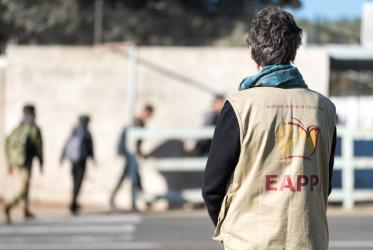By Albin Hillert*
At 4.45, the Qalandiya checkpoint is already crowded, as thousands upon thousands of Palestinians try to make their way to Jerusalem each day.
Qalandiya is the main checkpoint between the northern West Bank and Jerusalem, and ecumenical accompaniers (EAs) from the World Council of Churches’ Ecumenical Accompaniment Programme in Palestine and Israel (WCC-EAPPI) visit regularly in the early mornings.
Their task is to be an international presence and to show solidarity, offer basic support to anyone denied passage, and collect documentation of the situation at the checkpoint.
EAs’ reports feed into the UN system, providing ongoing monitoring of the human rights situation in Israel and Palestine.
Early morning life in the midst of occupation
“If you live in East Jerusalem outside the wall, or in Ramallah for example, and you work in Jerusalem, you need to be at the checkpoint early if you want to get to work on time. Getting through the checkpoint can take anything between one and several hours,” one of the EAs explains.

Today is a Monday, and Qalandiya is crowded with men of all ages queuing to go to work. People are let through intermittently, some 20-50 people at a time, all under careful control of Israeli security personnel.
“And if something happens while you are at the turnstile, the only way to move is back where you came from. And it’s not easy when it’s so crowded,” the EA adds.

Qalandiya has three turnstiles, each preceded by a narrow metal pathway made to constrain more than one person from going through at a time. As one turnstile is suddenly closed shut, people rush, push and climb to make it into one of the other two.
“But it’s also difficult to know what to think, when they are all so used to this system now,” the EA adds, reflecting on the risk of normalization of conditions under occupation.

A man sells bread and eggs on the Palestinian side of the checkpoint – breakfast for some, lunchbox material for others.

As morning breaks, dozens of men line up along the wall to pray, expressing their faith.

It’s 5.18 in the morning, and in the open space by the checkpoint, a group of men step aside for a moment to kneel for Fajr prayer (‘dawn prayer’) before going through the turnstiles.
What we can and cannot do
“I’ve lived in the United States most of my life, but I’ve moved home now to support my parents. They’re getting old, you know,” a young Palestinian man explains.

“I’m going to Jerusalem today to look for a job. I have a US passport, but because I’m Palestinian too, they won’t give me a visa. So I have to enter through the checkpoint on a permit,” the man says.

EAs monitor and document the situation at many checkpoints in Jerusalem and the West Bank, and offer basic support if anyone is denied passage, by asking to find out the reason given for the denial, and providing contact details to organizations – international, Palestinian, and Israeli ones – that can give practical support as necessary.
Work permits are usually given only for short periods, so they often need to be renewed, and there are sometimes glitches in communication between Israeli authorities and the Palestinians on changing rules or conditions for passage through the checkpoints, the EAs explain.

At the end of their shift, though the EAs with their visas could have taken an easier route, they get in line to pass through the turnstiles. “We do this to show solidarity, and also as a way of knowing at least a little better what it is that the Palestinians live every day,” one of them explains.

“I believe the occupation will not end in a short time,” says another one of the EAs. “Before I came here, I studied human rights. But it’s one thing to read and learn a lot about a situation, and another thing to be here, talk with the people, to see and feel what the situation is like.”
“It is important that this work continues. And it’s important for people who think about becoming EAs to know that we are not coming here to change everything. We don’t have the power. But what we can do is help change the mentality and the awareness of our societies about the situation here. And that can make a difference in the long run,” he concludes.
Early morning business: EAs accompany Bedouin shepherds in Jordan Valley (WCC feature of 7 October 2018)
EAs offer protective presence, night as well as day, as Khan al Ahmar faces demolition threat (WCC feature of 4 October 2018)
Learn more about the WCC-EAPPI
*Albin Hillert is communication officer for the World Council of Churches








